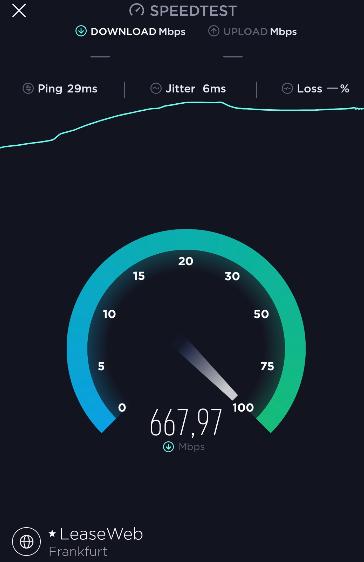Like many others in the industry, I am doing a lot of work in my ‘home office’ lately while the Corona virus continues to make normal life as we know it impossible. A lot of people, including myself, have started to use various video calling and conferencing solutions a lot more than before and I was quite surprised how many of those closed source and commercial solutions have a native Linux implementation.
600 Mbit/s Outside – 6 Mbit/s Inside
5G is slowly making its way into Cologne with incredible date rates. Recently, however, I discovered just what it means to have a simple insulating window between you and the network outside.
The Cloud Native 5G Core Network
When you look through the 5G core network specification documents of 3GPP such as TS 23.501 and 23.502 the idea I got was that it’s pretty much the same as before. Yes, the interfaces and network components have new names but by and large the 5G core network does the same things as today’s core networks and also pretty much in the same way. One thing that stands out just a little bit, though, is that control plane network components are now referred to as ‘functions’ and that the interfaces between them are now ‘service based’. In practice, that means the interactions are now stateless and use http query/responses and data is encoded in JSON format instead of the stateful connections with protocols for signaling interactions as before. O.k. so fine, I thought, 3GPP has moved to web based technologies. But that’s only the tip of the iceberg according to this interesting paper from 5G Americas on ‘5G and the Cloud’.
I’ve Got 5G At Home Now!
 A couple of weeks ago in January 2020 I spotted the first 5G antenna at the cell site that serves my home in Cologne on my way home. My first reaction: ‘Hm, that wasn’t there this morning…’. It wasn’t switched-on straight away. but when I came back from vacation early in February, I was greeted with a 5G logo after arriving at home. And even without ‘holding the phone the right way’ I immediately got well over 660 Mbit/s out of the downlink channel.
A couple of weeks ago in January 2020 I spotted the first 5G antenna at the cell site that serves my home in Cologne on my way home. My first reaction: ‘Hm, that wasn’t there this morning…’. It wasn’t switched-on straight away. but when I came back from vacation early in February, I was greeted with a 5G logo after arriving at home. And even without ‘holding the phone the right way’ I immediately got well over 660 Mbit/s out of the downlink channel.
5G RRC Protocol And How It Compares to 4G RRC
Recently I’ve been looking a bit at the 5G NR Radio Resource Control (RRC) protocol in 3GPP TS 38.311 to get an idea how it is structured and how it compares to the LTE RRC protocol specified in 3GPP TS 36.331. As Ralf points out in the comments below (thanks very much!) some parts of it are already used today to embed 5G configuration information in 4G RRC messages for EN-DC, while other parts will become relevant with 5G NR Standalone, i.e. once a 5G core network is available and devices and the gNBs have implemented standalone operation.
Continue reading 5G RRC Protocol And How It Compares to 4G RRC
5G TDD Inter-Operator Network Synchronization
Already back in 2018 I wrote a post that one new thing about 5G in TDD band n78 will be that network operators need to agree on a common uplink/downlink pattern and in addition synchronize their networks. Recently I was asked to what level of accuracy the networks need to be synchronized so I did a bit of research to find out.
Continue reading 5G TDD Inter-Operator Network Synchronization
Interesting Insights from the EU’s Roaming Report
A couple of weeks ago, Heise had a post on the newly published EU roaming report. Via this page you can get to the actual document that indeed has many interesting insights into pricing, cost and use of roaming in the EU before and after roaming charges became a thing of the past in June 2017. The document has 98 pages full of insights and here are the points that I found particularly interesting.
Continue reading Interesting Insights from the EU’s Roaming Report
Congested Peering and Transit
While I was investigating potential congestion issues in the roaming backhaul link of mobile networks I noticed again once more that this is by far not the only place where network operators are not providing enough capacity during busy hours in the evening. Another unfortunate example are fixed line access networks. Here are two examples over which I trip frequently.
Roaming Interface Congestion?
When I was recently in Austria I noticed that in the evening hours, the superb network speed I got over the LTE network in a town in the mountains at the place I was staying went from 40-50 MBit/s during the daytime to just 2-3 Mbit/s in the evening. Typical dissapointing busy hour overload at the LTE cell site due to underdimensioning I thought at first. But then I noticed that this was not quite the case.
IPv6 While Roaming
In the previous post I had a closer look at the ipv6-only APN of my mobile network operator of choice and how that brings me a step closer to the future of the Internet as it should be. By configuring and activating an additional APN profile, a device can instruct the network to only assign an IPv6 address and to perform DNS64 to reach IPv4 only hosts on the Internet. It works great while I’m in my home country but a bit of care needs to be taken to configure the APN profile properly for roaming.